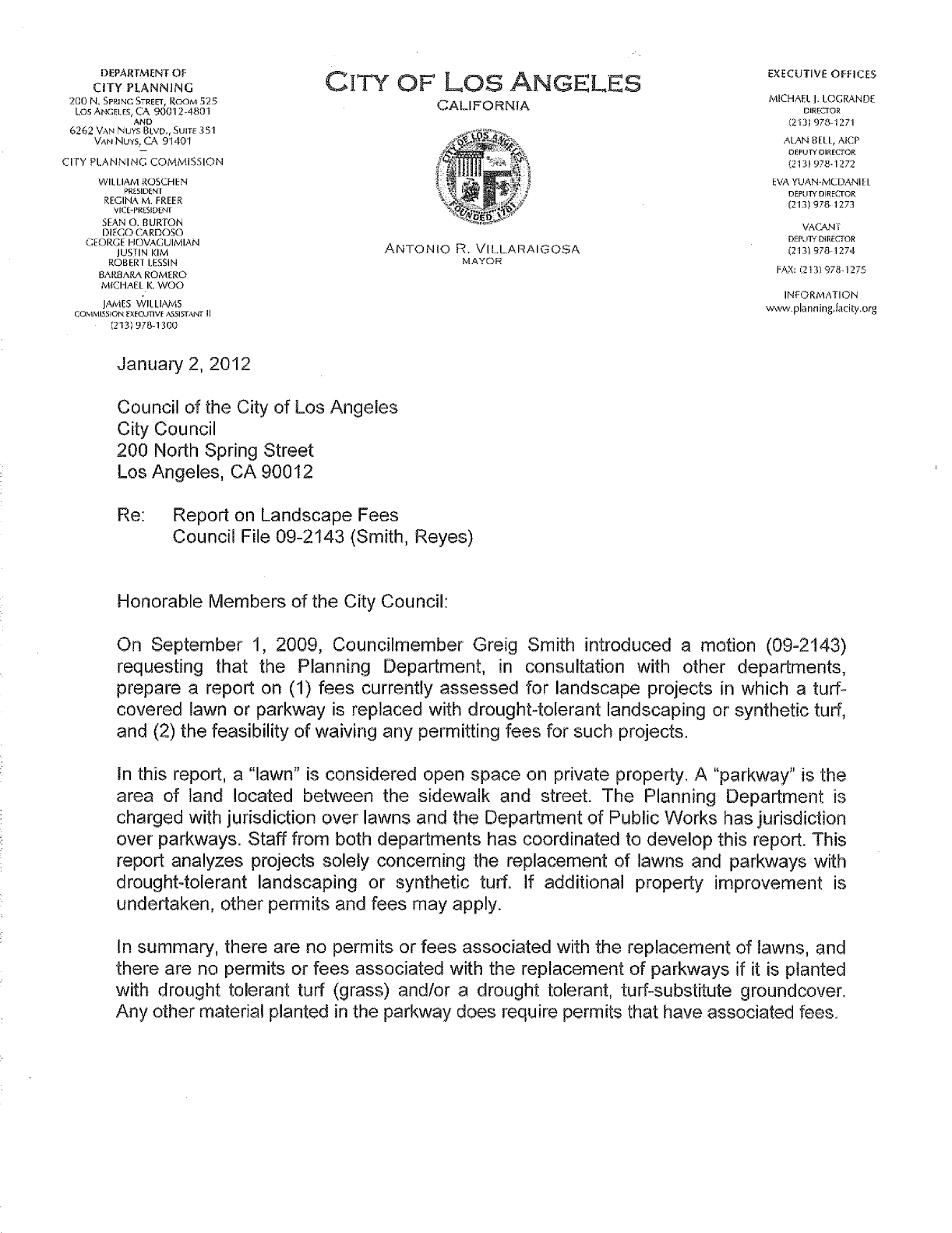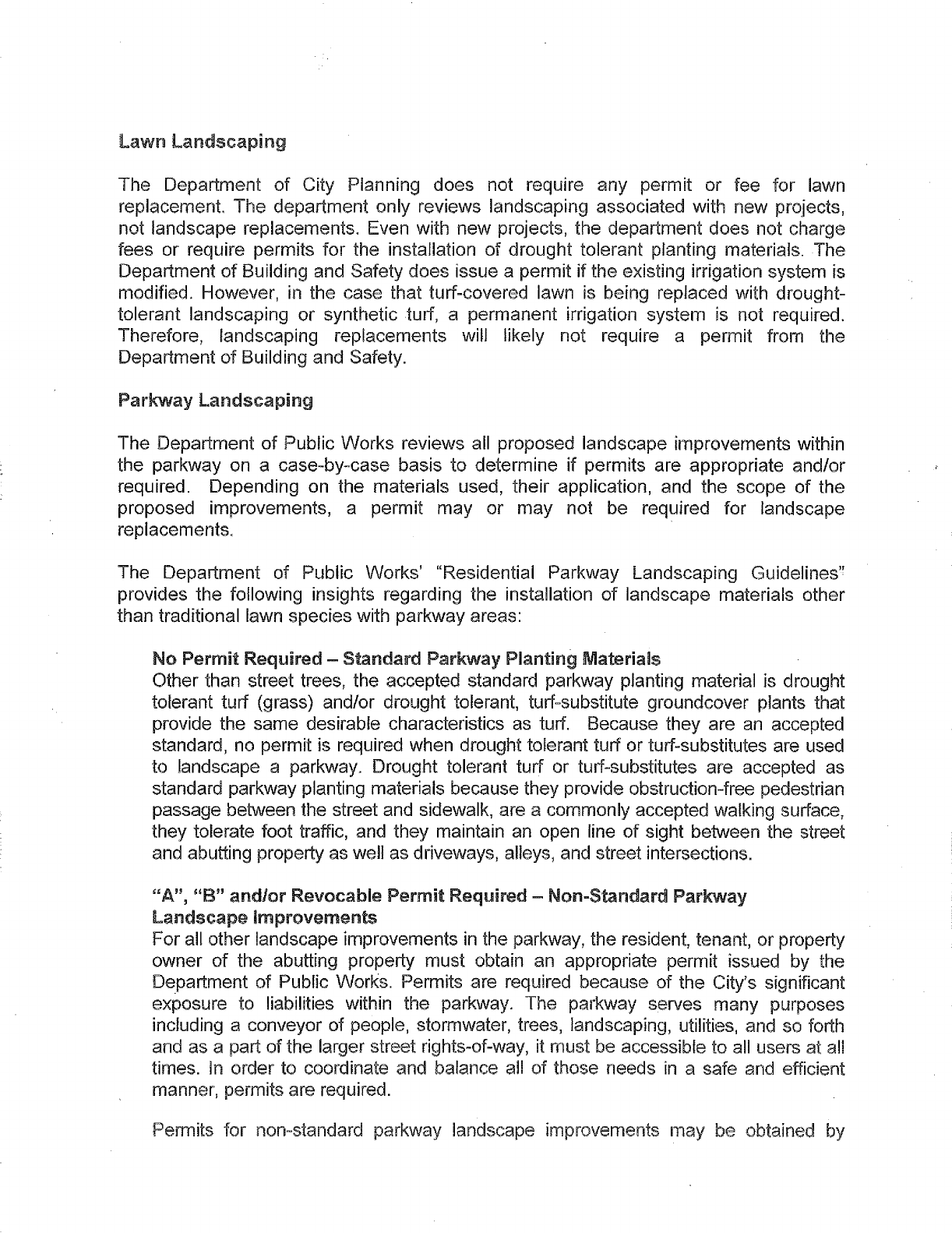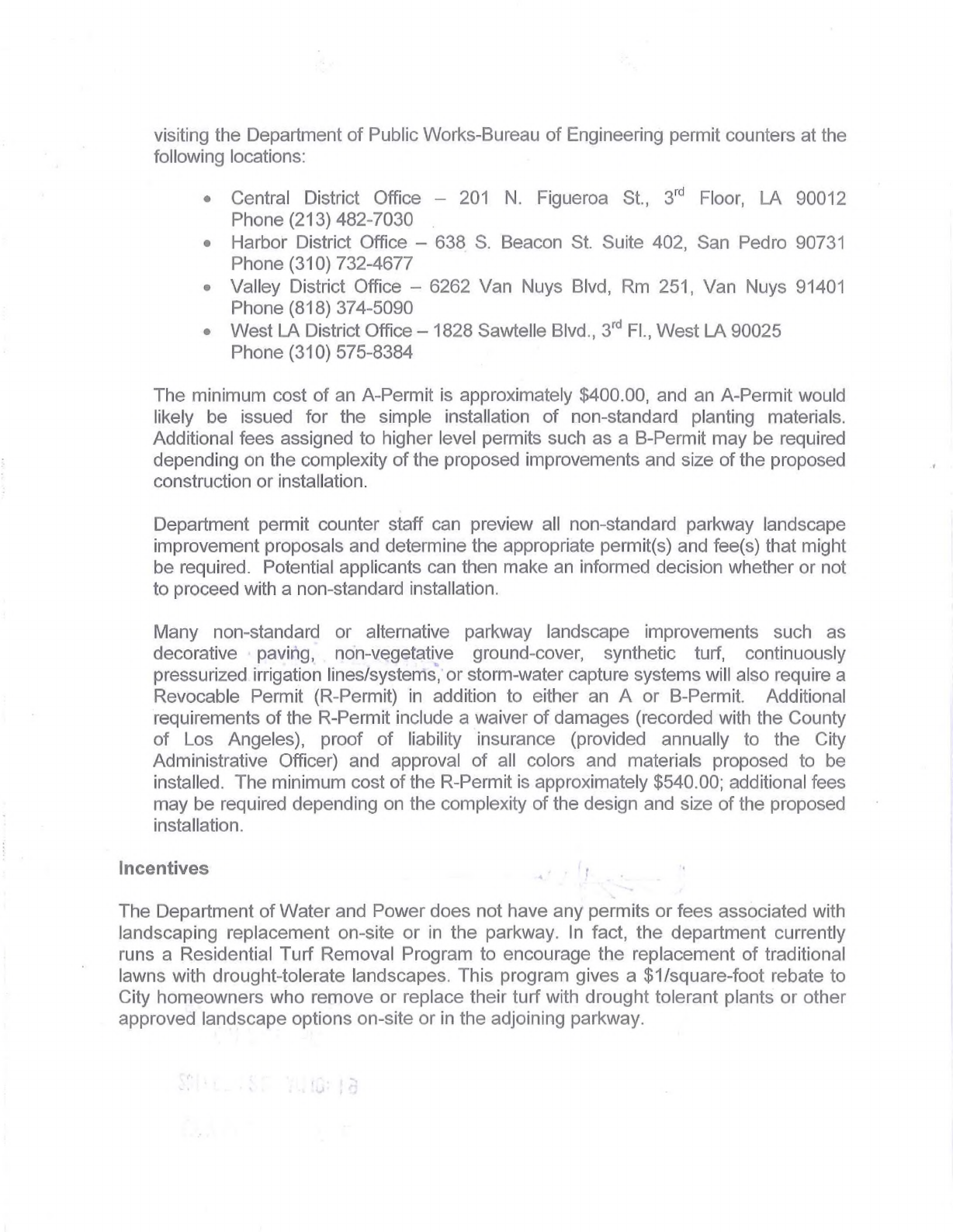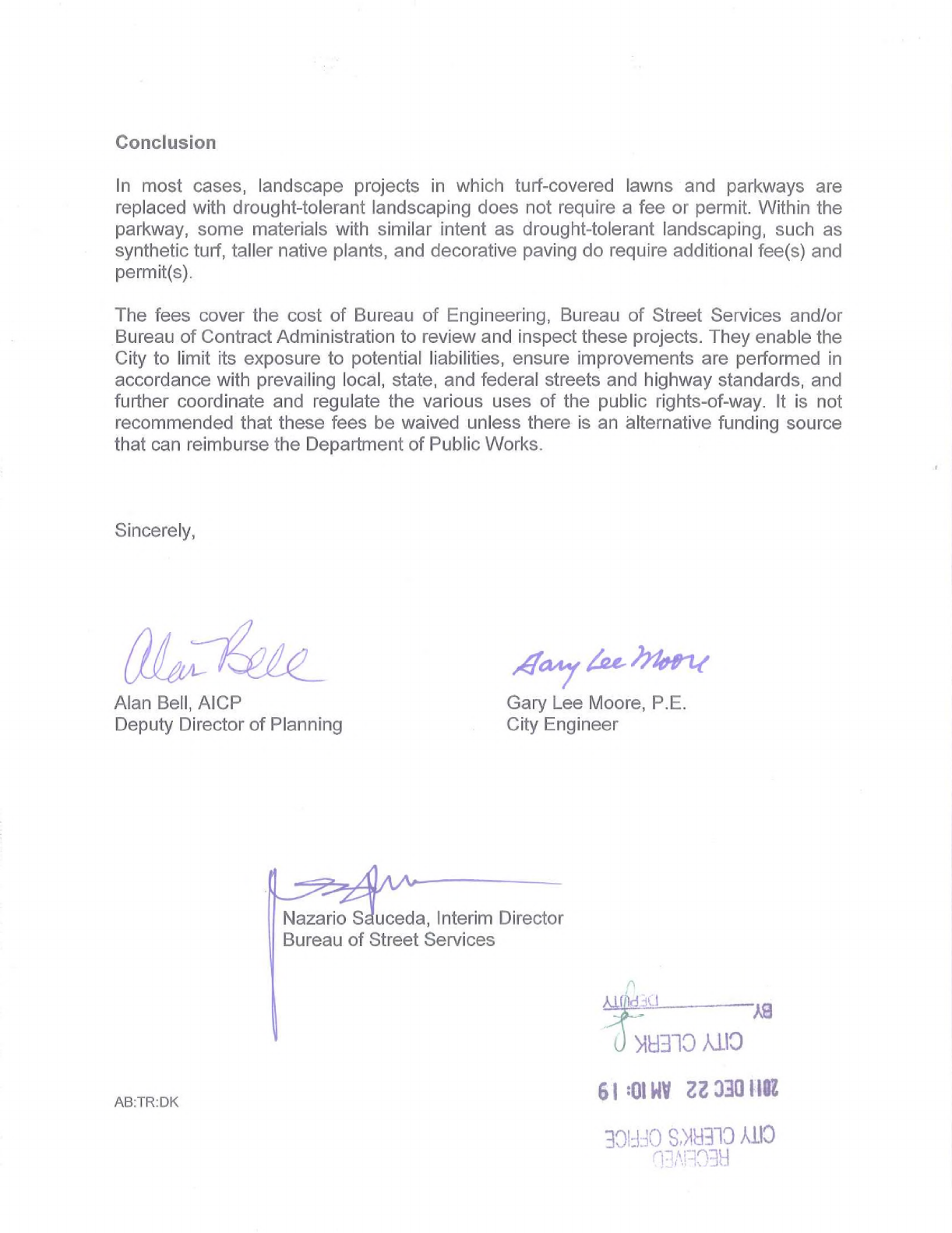
DEPARTMENT OF
CITY PlANNING
200
N, SPRINGSTRHT,
ROOM
525
Los
ANGRES,
CA
9001
2
AB01
AND
6262 VAN
NUY5 BLVD"
SUITE351
VAN
NUYS,
CA 91401
CITY PLANNING COMMISSION
WILLIAM ROSCHEN
PRESIDENT
REGINA M, FREER
VICE-PRESIDENT
SEAN
0,
BURTON
DIEGO CARDOSO
GEORGE HOVAGUIMIAN
JUSTIN KIM
ROB ERT LESSI
N
BAR8ARA ROMERO
MICHAEL K, WOO
JAMES WILLIAMS
COMMISSION EXECUTIVE AS5IST,\NT II
1213)978-1300
CITY OF
Los
ANGELES
CALIFORN[A
EXECUTIVE OFFICES
MICHAEL
J,
LOGRANDE
DIRECTOR
(2"13) 978-1271
ALAN 8ELL, AICP
OEPUTY DIRECTOR
(213) 978-1272
EVA YUAN-MCDANIEL
DEPUTY DIRECTOR
(213) 9781273
ANTONIO
R
VILLARAIGOSA
MAYOR
VACANT
DEPUTY DIRECTOR
(2131978-1274
FAX: (213) 978-1275
INFORMATION
www.planning.tacity.org
January 2, 2012
Council of the City of Los Angeles
City Council
200 North Spring Street
Los Angeles, CA 90012
Re: Report on Landscape Fees
Council File 09-2143 (Smith, Reyes)
Honorable Members of the City Council:
On September 1, 2009, Councilmember Greig Smith introduced a motion (09-2143)
requesting that the Planning Department, in consultation with other departments,
prepare a report on (1) fees currently assessed for landscape projects in which a turf-
covered lawn or parkway is replaced with drought-tolerant landscaping or synthetic turf,
and (2) the feasibility of waiving any permitting fees for such projects.
In this report, a "lawn" is considered open space on private property. A "parkway" is the
area of land located between the sidewalk and street. The Planning Department
IS
charged with jurisdiction over lawns and the Department of Public Works has jurisdiction
over parkways. Staff from both departments has coordinated to develop this report. This
report analyzes projects solely concerning the replacement of lawns and parkways with
drought-tolerant landscaping or synthetic turf. If additional property improvement is
undertaken, other permits and fees may apply.
In summary, there are no permits or fees associated with the replacement of lawns, and
there are no permits or fees associated with the replacement of parkways if it is planted
with drought tolerant turf (grass) and/or a drought tolerant, turf-substitute groundcover.
Any other material planted in the parkway does require permits that have associated fees.

lawn Landscaping
The Department of City Planning does not require any permit or fee for lawn
replacement The department only reviews landscaping associated with new projects,
not landscape replacements. Even with new projects, the department does not charge
fees or require permits for the installation of drought tolerant planting materials. The
Department of Building and Safety does issue a permit if the existing irrigation system is
modified. However, in the case that turf-covered lawn is being replaced with drought-
tolerant landscaping or synthetic turf, a permanent irrigation system is not required.
Therefore, landscaping replacements will likely not require a permit from the
Department of Building and Safety.
Parkway landscaping
The Department of Public Works reviews all proposed landscape improvements within
the parkway on a case-by-case basis to determine if permits are appropriate and/or
required. Depending on the materials used, their application, and the scope of the
proposed improvements, a permit mayor may not be required for landscape
replacements.
The Department of Public Works' "Residential Parkway Landscaping Guidelines"
provides the following insights regarding the installation of landscape materials other
than traditional lawn species with parkway areas:
No Permit Required - Standard Parkway Planting Materials
Other than street trees, the accepted standard parkway planting material is drought
tolerant turf (grass) and/or drought tolerant, turf-substitute groundcover plants that
provide the same desirable characteristics as turf. Because they are an accepted
standard, no permit is required when drought tolerant turf or turf-substitutes are used
to landscape a parkway. Drought tolerant turf or turf-substitutes are accepted as
standard parkway planting materials because they provide obstruction-free pedestrian
passage between the street and sidewalk, are a commonly accepted walking surface,
they tolerate foot traffic, and they maintain an open line of sight between the street
and abutting property as well as driveways, alleys, and street intersections.
"A", ~'B" and/or Revocable Permit Required - Non-Standard Parkway
landscape Improvements
For all other landscape improvements in the parkway, the resident, tenant, or property
owner of the abutting property must obtain an appropriate permit issued by the
Department of Public Works. Permits are required because of the City's significant
exposure to liabilities within the parkway. The parkway serves many purposes
including a conveyor of people, stormwater, trees, landscaping, utilities, and so forth
and as a part of the larger street rights-of-way, it must be accessible to all users at all
times. In order to coordinate and balance all of those needs in a safe and efficient
manner, permits are required.
Permits for non-standard parkway landscape improvements may be obtained by

visiting the Department of Public Works-Bureau of Engineering permit counters at the
following locations:
• Central District Office - 201 N. Figueroa St., 3
rd
Floor, LA 90012
Phone (213) 482-7030 .
• Harbor District Office - 638 S. Beacon St. Suite 402, San Pedro 90731
Phone (310) 732-4677
• Valley District Office - 6262 Van Nuys Blvd, Rm 251, Van Nuys 91401
Phone (818) 374-5090
• West LA District Office - 1828 Sawtelle Blvd., 3
rd
FI., West LA 90025
Phone (310) 575-8384
The minimum cost of an A-Permit is approximately $400.00, and an A-Permit would
likely be issued for the simple installation of non-standard planting materials.
Additional fees assigned to higher level permits such as a B-Permit may be required
depending on the complexity of the proposed improvements and size of the proposed
construction or installation.
Department permit counter staff can preview all non-standard parkway landscape
improvement proposals and determine the appropriate permit(s) and fee(s) that might
be required. Potential applicants can then make an informed decision whether or not
to proceed with a non-standard installation.
Many non-standard or alternative parkway landscape improvements such as
decorative paving, non-vegetative ground-cover, synthetic turf, continuously
pressurized irrigation llnes/systemaor storm-water capture systems will also require a
Revocable Permit (R-Permit) in addition to either an A or B-Permit. Additional
requirements of the R-Permit include a waiver of damages (recorded with the County
of Los Angeles), proof of liability insurance (provided annually to the City
Administrative Officer) and approval of all colors and materials proposed to be
installed. The minimum cost of the R-Permit is approximately $540.00; additional fees
may be required depending on the complexity of the design and size of the proposed
installation.
Incentives
The Department of Water and Power does not have any permits or fees associated with
landscaping replacement on-site or in the parkway. In fact, the department currently
runs a Residential Turf Removal Program to encourage the replacement of traditional
lawns with drought-tolerate landscapes. This program gives a $1/square-foot rebate to
City homeowners who remove or replace their turf with drought tolerant plants or other
approved landscape options on-site or in the adjoining parkway.

Conclusion
In
most cases, landscape projects in which turf-covered lawns and parkways are
replaced with drought-tolerant landscaping does not require a fee or permit. Within the
parkway, some materials with similar intent as drought-tolerant landscaping, such as
synthetic turf, taller native plants, and decorative paving do require additional fee(s) and
permit(s).
The fees cover the cost of Bureau of Engineering, Bureau of Street Services and/or
Bureau of Contract Administration to review and inspect these projects. They enable the
City to limit its exposure to potential liabilities, ensure improvements are performed in
accordance with prevailing local, state, and federal streets and highway standards, and
further coordinate and regulate the various uses of the public rights-of-way. It is not
recommended that these fees be waived unless there is an alternative funding source
that can reimburse the Department of Public Works.
Sincerely,
,4euylru~
Gary Lee Moore, P.E.
City Engineer
Alan Bell, AICP
Deputy Director of Planning
I
Nazario S uceda, Interim Director
Bureau of Street Services
AB:TR:DK
'1
~u
A8
)'U:1318All8
61 :01WV ZZ 330
UIZ
:lJi:UO S,W:Bl8 AlIQ
rl~!\\-=.j:J3H
